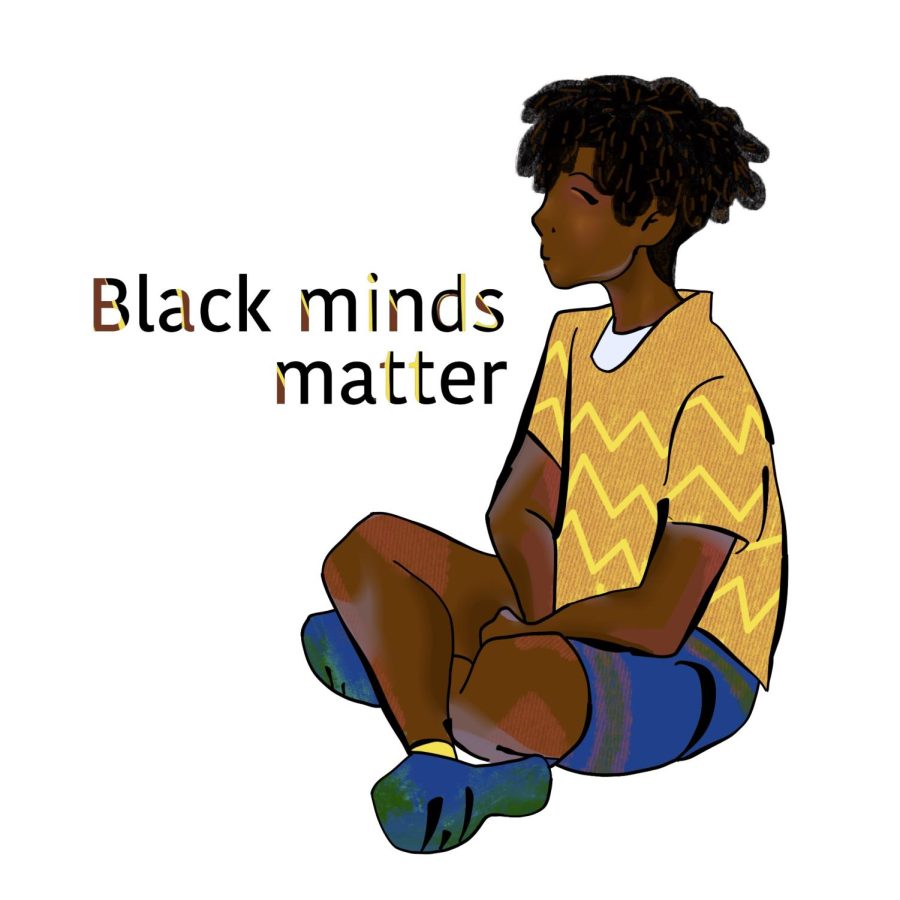Campus Views: Black minds matter
The most pressing issues in the Black community are the disparity in mental health resources, cultural stigmas and the lack of Black psychiatric health professionals. While I would argue that Gen Z has made considerable progress in shattering boundaries when discussing mental health, cultural and racial differences cause varying results in whether one receives it.
Black Americans make up approximately 13.6% of the population. Of the said population, 17.3% of Black/African-American adults experience the presence of mental illness. Meanwhile, African American psychologists make up only 5.08% of the psychology workforce as of 2021. How do we fix this? And how will this continue affecting us until we do?
Growing up, I was fortunate enough to have a family in which I was comfortable expressing myself emotionally or otherwise. Not every child is afforded this opportunity. A child who grows up feeling emotionally unsafe will more than likely lead to an adult who struggles to ask for help.
So where do we go from here?
In my eyes, the first step is fostering an open environment where it is not only acceptable but crucial that you express when you need help. There are four facets that encompass our bodies as humans: spiritual, emotional, physical and mental. When one suffers, it will inevitably trickle to the others. According to the Centers for Disease Control and Prevention, depression can give way to health problems such as diabetes, heart disease and strokes. It is important to note that the first two already affect the Black community at historically disproportionate rates.
The mental health experiences of Black people are unique in that they are intermingled with the traumas of systemic racism, hesitance to receive treatment (you may know of the Tuskegee Syphilis Experiment), health insurance disparities and much more. As mentioned previously, there is a small presence of Black professionals in the field of mental health services. While race does not correlate with service quality, many Black patients find that working with a Black professional serves them better through the means of shared cultural experiences and trust. The psychiatric world commits a disservice by ignoring this fact.
Over the past several years, many Black celebrities have invigorated the mental health conversation; from Tyler Perry to Kid Cudi to Janet Jackson. Last year Stephen ‘tWitch’ Boss died by suicide. Upon hearing the news, my heart twisted with sorrow and disbelief as I vainly reread the headline. Memories of his radiant smile and infectious light on “The Ellen Show” flooded my mind almost immediately. My heart ached for his wife and children, for him. More than anything, I wished to let him know that he was understood. His passing ignited an imperative conversation on high-functioning depression and the unique plights Black men face.
It isn’t hard to recognize that we have a ways to go in regard to this issue. The Black experience is a myriad of intricacies, and our mental health isn’t any different. There aren’t short answers, nor are there quick solutions.
Improving mental health in the Black community requires a multifaceted approach that addresses both systemic and individual issues. Here are some potential solutions:
Encourage mental health awareness and education: Many in the Black community may not have access to information about mental health, or may not realize that they are experiencing symptoms of mental illness. Facilitating mental health education can help recognize the signs of mental illness and seek appropriate treatment.
Address systemic barriers: Structural inequality, racism and implicit bias can contribute to poor mental health outcomes in the Black community. Addressing systemic walls can involve championing policies and programs that promote equity and access to resources, as well as engaging in community organizing and activism.
Increase access to mental health services: Many in the Black community face barriers to accessing mental health services, such as a lack of insurance coverage, transportation and culturally qualified providers. Expanding access to mental health services can involve easier access to insurance coverage, providing assistance with transportation and training more providers in culturally qualified care.
Self-Care: The promotion of self-care can help individuals in the black community manage stress and cope with adversity. This can involve promoting lifestyle habits such as exercise and healthy eating, as well as providing opportunities for social support and community involvement.
Challenge stigma: Stigmatizations surrounding mental illness can prevent the seeking of treatment and can contribute to feelings of shame and isolation. Reducing stigma can involve promoting positive expressions of mental health in the media and popular culture, as well as engaging in public education campaigns and advocacy endeavors.
Overall, addressing mental health in the Black community requires a comprehensive and integrated approach that addresses both systemic and personal factors. By instilling these policies, we can work towards improving mental health outcomes in the Black community.
The Black diaspora has known pain and strife but it has come to know resilience all the same. With each passing day, I am confident that we are moving a step closer to cultivating positive emotional health for generations to come. Happy Black History Month, you matter.
Kia Render is a guest columnist from the Kent State student group Active Minds. Contact Render at [email protected].




KK • Mar 21, 2023 at 7:48 pm
EXCELLENT
Well stated, factual information INDEED!